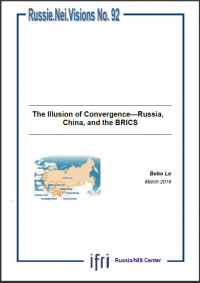Gateway to Think Tanks
| 来源类型 | Publications - Policy Papers - Russie.NEI.Visions |
| 规范类型 | 简报 |
| DOI | 978-2-36567-491-1 |
| The Illusion of Convergence—Russia, China, and the BRICS Russie.Nei.Visions, No. 92, March 2016 | |
| Bobo LO | |
| 发表日期 | 2016-03-16 |
| 出处 | Russie.NEI.Visions |
| 出版年 | 2016 |
| 概述 | The discussion about the BRICS (Brazil, Russia, India, China, and South Africa) opposes two narratives. The first considers they play an increasing role in the international relations as the West is loosing power; the other sees the BRICS as a charade. But the key role played by the... |
| 摘要 |
The Illusion of Convergence—Russia, China, and the BRICS Russie.Nei.Visions, No. 92, March 2016
The discussion about the BRICS (Brazil, Russia, India, China, and South Africa) opposes two narratives. The first considers they play an increasing role in the international relations as the West is loosing power; the other sees the BRICS as a charade. But the key role played by the interaction between Russia and China is an evidence shared by most experts. 
The Illusion of Convergence—Russia, China, and the BRICS
Download
0.65 Mo
Two narratives have dominated discussion of the BRICS (Brazil, Russia, India, China, and South Africa). The first asserts that this group of countries has become a major force in 21st century international politics, highlighting the shift of global power from the West. The second, by contrast, sees the BRICS as a charade, marked by the gulf between extravagant rhetoric and minimal achievement. The debate could scarcely be more polarized. Yet on one point there is convergence: the key to the viability of the BRICS framework lies in effective interaction between its two principal players, Russia and China. Moscow and Beijing have assiduously promoted an image of likemindedness within the BRICS. But such efforts can hardly mask significant differences in attitudes and approach. President Putin identifies the BRICS as the foundation of a non-Western multipolar order in which Russia plays a central role. For the Chinese, however, it is a sideshow – only one among many instruments for advancing their interests in Eurasia and beyond. These contrasting perspectives severely limit the potential of the BRICS to offer an alternative model of global governance or act as an effective engine of international development. While the BRICS will remain part of the international landscape over the next few years, its relevance will come under increasing question. Bobo Lo is an independent analyst. He was previously Director of the China and Russia Programmes at the Centre for European Reform; Head of the Russia and Eurasia Programme at Chatham House; and Deputy Head of Mission at the Australian Embassy in Moscow. He is an Associate Fellow of Chatham House’s Russia and Eurasia Programme, and an Associate Research Fellow with the Russie/NEI programme of the French Institute of International Relations (IFRI). Bobo Lo has an MA from Oxford and a PhD from the University of Melbourne. |
| 关键词 | BRICS |
| URL | https://www.ifri.org/en/publications/enotes/russieneivisions/illusion-convergence-russia-china-and-brics |
| 来源智库 | French Institute of International Relations (France) |
| 引用统计 | |
| 资源类型 | 智库出版物 |
| 条目标识符 | http://119.78.100.153/handle/2XGU8XDN/416156 |
| 推荐引用方式 GB/T 7714 | Bobo LO. The Illusion of Convergence—Russia, China, and the BRICS Russie.Nei.Visions, No. 92, March 2016. 2016. |
| 条目包含的文件 | ||||||
| 文件名称/大小 | 资源类型 | 版本类型 | 开放类型 | 使用许可 | ||
| capturernv92_eng.jpg(30KB) | 智库出版物 | 限制开放 | CC BY-NC-SA |  浏览 | ||
| ifri_rnv_92_bobo_lo_(660KB) | 智库出版物 | 限制开放 | CC BY-NC-SA | 浏览 | ||
除非特别说明,本系统中所有内容都受版权保护,并保留所有权利。